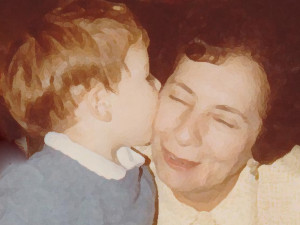The Role Of A Grandparent

Connect Your Grandchildren
Grandparents hold a very unique position– lots of love and, often, a bit more time, plus usually not facing the unceasing demands put upon parents by the care of young children. When you connect your grandchildren to books, you build a link that will nourish them the rest of their lives. Here are a few ideas I have found successful to help connect your grandchildren to the joys of reading and learning.
1. Use snail mail. Everyone loves to get something addressed to them in the mail, (even adults when it isn’t junk mail or bills). You can start early sending things to your grandchild. Always write something about what you send. Start really early, from before age 1 and continue on up, to connect something fun in the mail with words.
Postcards— I remember watching my very young grandson looking at a postcard I sent. First he looked at the picture on the front, and then he turned it over and looked at the words, knowing that it said something from Grandma. (This last part thanks to his parents who took time to read what it said when he got the postcard in the mail.) And you can send postcards from anywhere. They are all over the place, not just at exotic destinations, (although those would be great, too). Even if you live in the same town as your grandchild, you can send postcards from that town. I’ve bought them at our local history museum, at the store that sells oranges, at the Chamber of Commerce. And you can send postcards from trips you make. Sending them from different places can also help them learn geography. This is an activity that can be continued as the child gets older.
An Envelope with Pictures or later with pictures and articles
Photos you took
Photos of family members
Colorful, cut-out pictures from magazines
I read about a grandfather who read the newspaper every day and would cut out articles about things that he thought his children or grandchildren were interested in and mail it to them.
Always write something to go with it.
It’s exciting to get something in the mail. Start early connecting what you send to words– developing communication skills.
2. Use E-mail, Messaging, Facetime, Skype—
Pictures — Just pictures you think they will be interested in, or a picture of the book you are reading, or a picture of a book you are sending or something you saw that you liked. I recently sent a little video of a cement truck turning and some pictures of houses being constructed nearby that I took with my tablet. It fits in well with interest in block building and the book What Do People Do All Day? by Richard Scarry.
Read to Them–Read a book using Facetime or Skype, or even on the phone. Then send them the book you have read. Look at Blog Post #3 for some suggestions of where to get children’s books.
3. Send Books— Of course we’d love it if you sent our books, which are designed to encourage imagination and fun in reading and an appreciation of nature. But, there are many wonderful, wonderful books to send. What better gift, and the kind of gift you can continue for years to come. If you don’t know which books to send, there are all kinds of lists of suggested books for children, such as the lists on this website
http://www.teachersfirst.com/100books.cfm, or from your local library. And don’t forget to listen to what your grandchild is interested in. We recently sold some of our Pelican Family Series books to a grandmother whose grandchild lived in Florida and was in the “Pelican” group at her preschool.
4. Send a Magazine Subscription— There are a lot of great magazines for children. The subscription costs are fairly low and they give the child a year’s worth of fun reading. Two that I like are Ranger Rick, http://www.nwf.org/kids/ranger-rick.aspx, and National Geographic for Kids, http://kids.nationalgeographic.com/.
5. Read to Your Grandchildren and Talk to Them About Books and Reading–Especially when they are young you have an opportunity to be a powerful influence to encourage your grandchildren to become readers and to let them know that their adults value reading. Don’t miss out on that opportunity. It will make a difference.
The more time and effort you spend to connect your grandchildren to the power of reading, the the more options you give them later in life.
